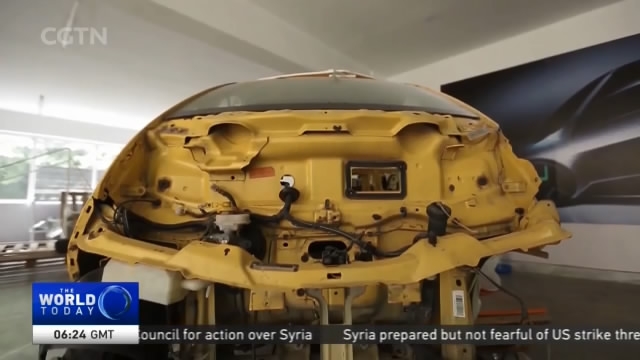
15:49, 12-Apr-2018
India Ban on Diesel Cars: India to stop selling petrol and diesel cars by 2030

India is changing gears. In April 2017, the government announced the country would stop selling petrol and diesel cars by 2030. For a country that runs on gas-guzzlers, it's an ambitious target. But start-ups have decided to take the challenge head-on. We take you to meet Hriman Motors, which will launch electric cars, it says, with batteries that will outlast the vehicles.
Driving ambition. The world's fifth largest auto market – India has announced that it will stop selling petrol and diesel cars by 2030. This is part of the Modi-led government's vision for a renewable energy revolution. The impact – massive. It would cut India's oil bill by 60 billion dollars and will reduce emissions by nearly 40 percent. Start-ups and innovators are using this opportunity to launch electric cars that will change how India moves. Meet Dr. Rushen Chahal. He is the founder of Hriman Motors. The car company few months back announced a plan to launch an electric car in India that will be lowest on running cost. The work is on in full swing and the 2-seater car called RT-90 will be launched within the next one year. The plan is to give a complete ecosystem to the consumer including a charging point.
DR. RUSHEN CHAHAL FOUNDER, HRIMAN MOTORS "We have done extensive trials on the entire drive system, battery pack, various other technologies, composites that we are putting into the car. The composites could be metal composites or could be plastic and polymer composites. We are almost done and we are now in the final build of the car. There is a financial model that we have built around it where you know all you need to do is pay us 10 dollars, own the car and then for every 3 or 4 kilometres that you drive you pay us a dollar and that covers everything for the car."
The dealer and servicing network is being set up as the company drives towards the launch. Within the next 2 years, the company also plans to launch an electric seater bus and a 4-seater car.
SHWETA BAJAJ MUMBAI "One of the biggest challenges for India to go completely electric is unique ecosystem and that's the reason that the car companies have to manufacture in India for various different parts of the country."
The RT-90 will travel for 200 km maximum range per charge that will take 10 minutes to charge on a fast charger and 1-2 hours to charge on the current chargers that are approved in India. The car would have a lithium titanium battery that is said to have a 3-time life of a car and is suited for Indian temperatures. India sold 3 million passenger cars in the financial year 2016-2017, but only 22-thousand were electric vehicles. Recently the Indian government hinted that the 2030 deadline might be too ambitious and talked about bringing a policy. But the start-ups say, the government should leave the private sector develop its own market without interfering.
DR. RUSHEN CHAHAL FOUNDER, HRIMAN MOTORS "They should not try and do a policy or get into the mobility space because India is not one country per se when you look at the number of people, thought process. We are a probably 50 countries put together as one country, the mass is not homogeneous."
India is all set to become the world's 3rd largest car market by 2020. And the demand is only expected to rise in a country of 1.2 billion people. Many car companies are now planning to enter the Indian market to fill up a space that massive electric car demand will create, including Tesla. Its rapid innovations that will steer the industry into the fast lane. Shweta Bajaj, CGTN, India.

SITEMAP
Copyright © 2018 CGTN. Beijing ICP prepared NO.16065310-3
Copyright © 2018 CGTN. Beijing ICP prepared NO.16065310-3